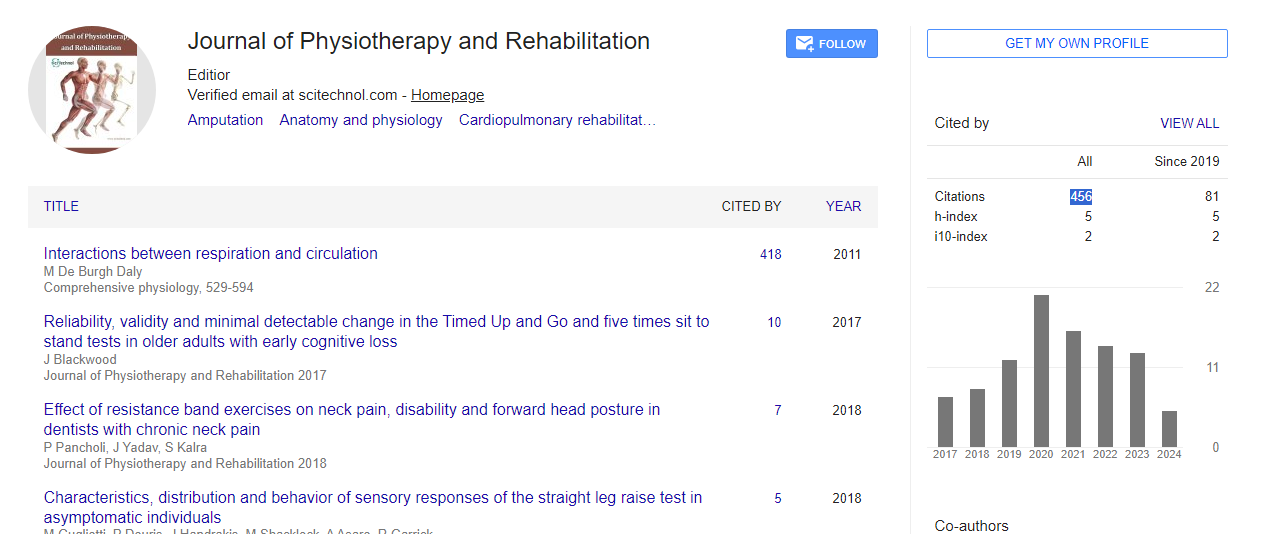Commentary, J Physiother Rehabi Vol: 7 Issue: 5
Integrating Psychoneuroimmunology in Rehabilitation Therapies
Segerstrom Filipovic*
1Department of Rehabilitation Medicine, Royal Melbourne University, Melbourne, Australia
*Corresponding Author: Segerstrom Filipovic,
Department of Rehabilitation Medicine, Royal Melbourne University, Melbourne, Australia
E-mail: segersfilip@mu.org.au
Received date: 24 September, 2023, Manuscript No. JPTR-23-121675;
Editor assigned date: 27 September, 2023, PreQC No. JPTR-23-121675 (PQ);
Reviewed date: 11 October, 2023, QC No. JPTR-23-121675;
Revised date: 18 October, 2023, Manuscript No. JPTR-23-121675 (R);
Published date: 25 October, 2023, DOI: 10.4172/JPTR.1000154
Citation: Filipovic S (2023) Integrating Psychoneuroimmunology in Rehabilitation Therapies. J Physiother Rehabi 7:5.
Description
Rehabilitation is a dynamic field that constantly changes to embrace innovative approaches aimed at optimizing patient outcomes. One such innovative frontier is the integration of Psychoneuroimmunology (PNI) into rehabilitation therapies. This approach recognizes the intricate interplay between psychological processes, neurological functions and the immune system in influencing an individual's health and recovery. By understanding and utilizing these connections, rehabilitation practitioners can customize interventions to address not only the physical aspects of conditions but also the psychological and immunological dimensions, promoting overall health and wellbeing.
Incorporating mind-body therapies such as mindfulness meditation, yoga and illustrations into rehabilitation programs can positively influence the interconnected systems. These practices have demonstrated the ability to reduce stress, enhance emotional well-being and modulate immune responses. For individuals undergoing rehabilitation, developing mental resilience through mind-body techniques can expedite recovery and improve overall health outcomes.
Cognitive Behavioral Therapy (CBT), a widely utilized psychological intervention, can be integrated into rehabilitation for conditions ranging from chronic pain to neurological disorders. By addressing maladaptive thought patterns and behaviors, CBT not only contributes to mental well-being but also has implications for immune function. Studies suggest that psychological stress, when unmanaged, can inhibit the immunological system, and CBT becomes a valuable tool in breaking this cycle.
Understanding the principles of neuroplasticity, where the brain can adapt and reorganize itself, opens avenues for innovative rehabilitation strategies. Visualization in the mind, a technique utilizing mental capacity to simulate movement or activity, can contribute to neuroplastic changes. By pairing mental exercises with physical rehabilitation, practitioners can potentially enhance neural recovery and immune responses.
Biofeedback, which enables individuals to gain awareness and control over physiological processes, can be extended to influence immune responses. Through techniques like heart rate variability biofeedback, individuals can learn to modulate their autonomic nervous system, impacting immune function. This integration represents a paradigm shift in rehabilitation, acknowledging the profound influence of psychological states on the body's ability to heal.
Recognizing the impact of social and emotional factors on health outcomes, rehabilitation programs should prioritize emotional support and social connectivity. PNI analysis highlights the role of positive social interactions in enhancing immunity. Therefore, developing a supportive rehabilitation environment that encourages mental health and social connections is important for adequate recovery.
Nutrition plays a pivotal role in immune function and rehabilitation programs can integrate immunonutrition strategies. Ensuring that individuals undergoing rehabilitation receive adequate nutrients that support immune health becomes a complementary aspect of care. Collaboration between nutritionists and rehabilitation teams can optimize dietary plans to fortify the immune system.
Chronic stress is known to compromise the immune system. Rehabilitation programs incorporating stress reduction techniques, such as progressive muscle relaxation, deep breathing exercises and meditation, empower individuals to manage stressors effectively. By decreasing the effects of stress, these techniques contribute to a more robust immune response.
Integrating PNI into rehabilitation involves educating patients about the connections between their mental state, neurological processes and immune function. Empowering individuals with knowledge about how their lifestyle and mindset influence their recovery can enhance treatment adherence and contribute to more favorable outcomes.
The integration of PNI into rehabilitation therapies represents a paradigm shift towards broader perspective and personalized care. Recognizing the advanced connections between the mind, body and immune system allows rehabilitation practitioners to customize interventions that deal with the complex aspects of health.
 Spanish
Spanish  Chinese
Chinese  Russian
Russian  German
German  French
French  Japanese
Japanese  Portuguese
Portuguese  Hindi
Hindi 